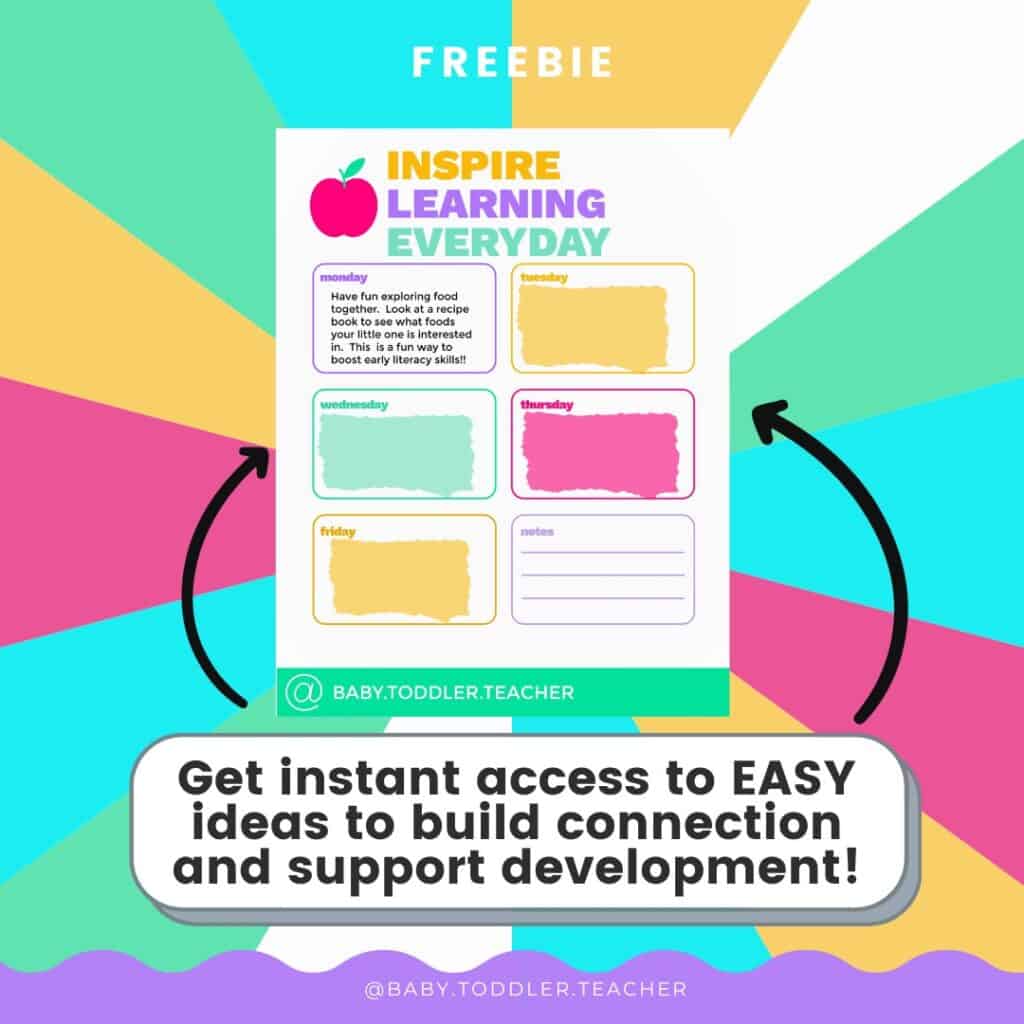Your Baby is Now 6 Months Old!
As new parents, you’re likely eager to engage in activities that will contribute to your baby’s development, turning their learning journey into a fun experience.
This blog post is designed to help you navigate through this wonderful period of your baby’s growth.
I have compiled a list of my favorite activities as a mom of 2 and someone who has worked in early childhood for over 10 years that are not only fun but also aid in the development of key motor, cognitive, and social skills.
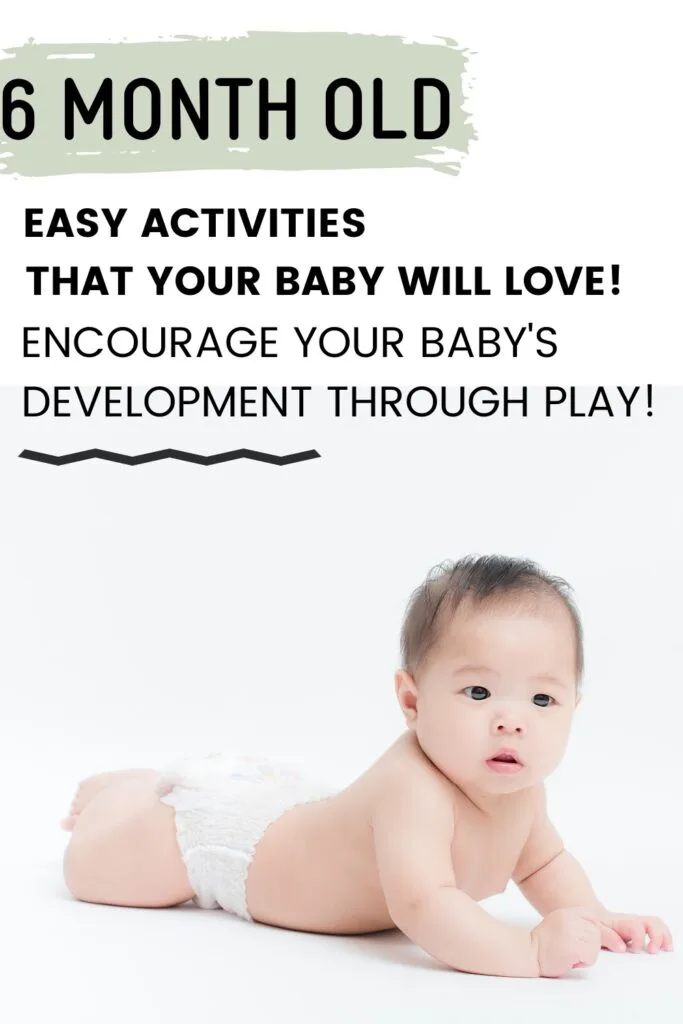
(This post may contain affiliate links. To read our full disclosure policy click here.)
What Developmental Milestones Is Your Baby Working on?
At the 6-month mark, your baby is working on several developmental milestones.
Each baby is unique and will develop at their own pace, so it’s important to remember that these milestones serve as a guide, not a deadline.
One of the key milestones is the development of fine motor skills.
You might notice your baby starting to reach for objects with more precision, and even transferring items from one hand to another.
This is an exciting new skill that will soon evolve into more complex movements like picking up small objects between the thumb and forefinger.
Language development is also a focus at this age.
You may hear your baby start to babble and experiment with sounds.
This is the early stage of speech and language development, and it’s a joy to see your baby communicate in their unique way.
Gross motor skills are also improving at this stage.
With increased head control, your baby is likely starting to sit with some support and may be trying to move about through rolling.
These movements are the building blocks for crawling, so it’s an exciting time!
Regarding social skills, your baby is becoming more aware of their surroundings and the people in it.
They may start to recognize familiar faces, and their visual tracking is improving as they begin to follow moving objects with their eyes.
Cognitive skills are also starting to emerge, with your baby showing increased curiosity during awake time.
They may start to explore objects in more detail, banging them together, or putting them in their mouth.
Remember, all babies are different, and if you have any concerns about your baby’s development, reaching out to early intervention services can be incredibly helpful.
They can provide you with resources and support to ensure your baby is progressing well and meeting their developmental milestones.
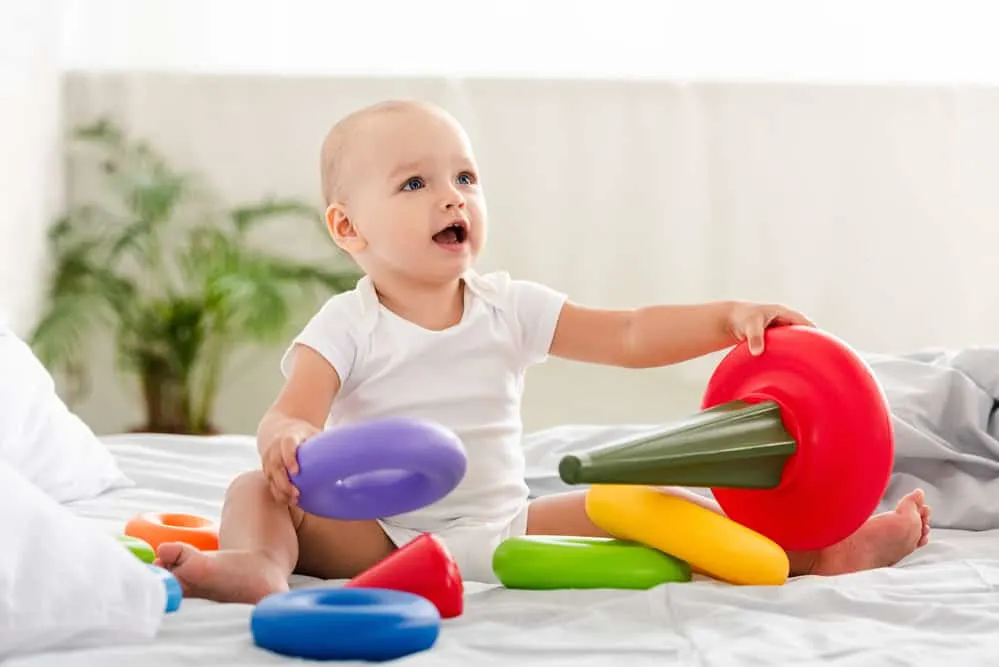
Fun Play Ideas to Try Out
One of the best ways to encourage your baby’s development is to engage in playtime with them.
This provides a delightful bonding experience and aids in critical brain development.
Changing your baby’s position during playtime can stimulate various developmental skills.
For instance, letting them play while sitting can improve their balance and strength.
In the same vein, “tummy time” is another fantastic play position.
Yes….even as your baby gets older tummy time still has many benefits!
Place toys in front of your baby during tummy time to help them build the neck, back, and arm muscles necessary for crawling.
Similarly, encouraging play while your baby is on their back can boost hand-eye coordination.
One particularly engaging play activity involves the use of mirrors.
Babies are mesmerized by their reflections, and placing a mirror (like this) in front of a baby can prove both motivating and intriguing.
You might also place small toys or their favorite toys in front of a mirror to make the experience even more stimulating.
Water play is another excellent addition to playtime.
It not only provides sensory stimulation but also opens up avenues for early lessons in cause-and-effect.
You can keep this very simple, for example just filling a cakepan of water and letting them explore it.
Remember, your participation in playtime is paramount.
Your interaction and engagement will make these activities rewarding and enjoyable, setting the stage for a lifetime of learning.
Learning Happens Through Daily Routines
Embedding learning into your daily routines is a low-stress approach that can offer numerous opportunities for your child to learn through repetition.
It’s a good idea to create an environment where play and learning go hand-in-hand, making every moment a learning opportunity in different ways.
For instance, a simple game of peekaboo while folding laundry can be a great way to work on social and emotional development.
This classic game not only brings a lot of laughter but also teaches your baby about object permanence – the understanding that objects continue to exist even when they can’t be seen.
Similarly, bath time can be transformed into a sensory play experience.
Offering different textures for exploration and creating different sounds with the water can stimulate your baby’s senses while also promoting cognitive development.
Singing nursery rhymes when changing a diaper or during feeding times can be an enjoyable activity for both you and your baby.
This not only creates a pleasurable experience but also supports language development by familiarizing your baby with different sounds and patterns of speech.
Even cooking time can be an engaging learning experience.
Hand your baby a wooden spoon or a safe kitchen utensil to explore and this could stimulate their curiosity, improve fine motor skills, and introduce them to the concept of cause and effect.
Incorporating mirror play into your daily routine can also enhance your self-awareness and social skills.
A mirror can be an exciting toy that can introduce your baby to their reflection, teach them about different facial expressions, and encourage interactive play.
Every moment can be a learning opportunity in different ways.
By incorporating these simple strategies, you can turn everyday routines into rich learning experiences for your baby.
If you need help figuring out how to do this with your baby I have it all laid out for you HERE.
Read with Your Baby
Reading with your baby is a fantastic way to encourage their overall development.
This simple activity can stimulate your baby’s brain, fostering language skills, social development, and even hand-eye coordination.
When you read to your baby, you’re not just sharing a fun way to pass the time; you’re also creating a nurturing environment that promotes learning and growth.
The rhythmic flow and varied tones of your voice as you read are instrumental in acquainting your baby with different sounds and speech patterns, bolstering their language acquisition.
Moreover, pointing to pictures and turning pages can enhance your baby’s hand-eye coordination, encouraging their fine motor skills.
But beyond the cognitive benefits, reading also aids in social development.
The shared experience of reading helps build a strong bond between you and your baby, instilling a sense of security and emotional well-being.
Incorporating reading into another routine such as bedtime, can further augment its benefits.
A bedtime story can serve as a calming activity that signals to your baby that it’s time to sleep, aiding in establishing a consistent sleep routine.
Therefore, this simple and enjoyable activity doesn’t just provide immediate benefits, but also seeds the love for lifelong learning in your child’s heart.
You can find some of my favorite books for babies here!
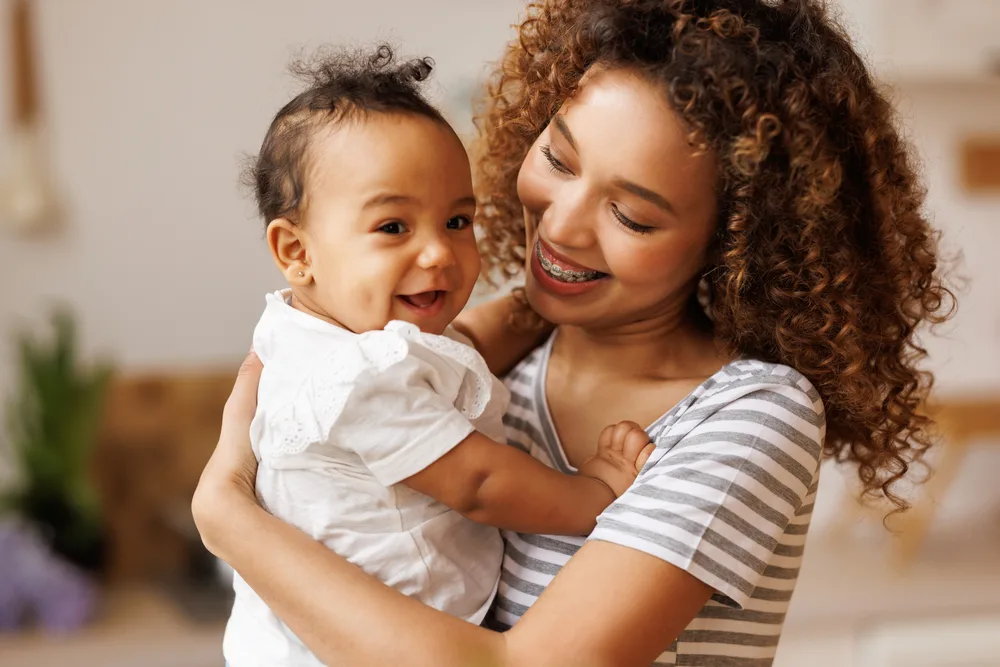
Have fun with your baby!
From engaging in fun activities like playtime to incorporating learning into daily routines, every interaction can foster a child’s growth.
Using baby toys during playtime, such as mirrors or safe kitchen utensils, can stimulate their curiosity while strengthening their physical and cognitive abilities.
Baby activities like mirror play, water play, tummy time, and reading can act as a great way to not only entertain and bond with them but also to encourage their social, emotional, and language development.
The journey of nurturing your baby’s growth is filled with enjoyable moments that effectively set the stage for their lifelong learning, ensuring that they meet their developmental milestones in a healthy and engaging manner.
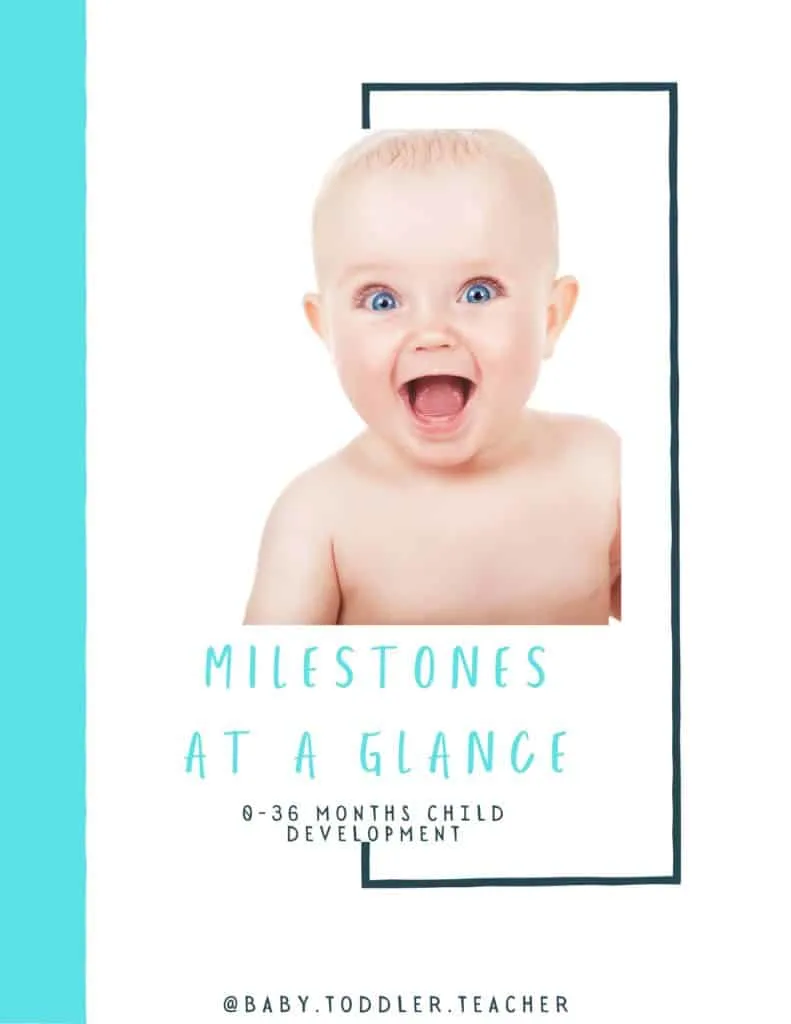
Grab your FREE Milestone Guide HERE.
Frequently Asked Questions
At this stage, babies are intrigued by toys with different textures, colors, and sounds. Rattles, teething toys, soft blocks, and plush toys are excellent options. Mirrors are also a great toy to stimulate self-awareness and curiosity.
There are many ways to incorporate learning into daily routines. For instance, play peekaboo while folding laundry, sing nursery rhymes during a diaper change, or let your baby explore safe kitchen utensils during cooking time.
Absolutely! Reading to your baby stimulates brain development, fosters language skills, enhances social development, and improves hand-eye coordination. It also helps to create a strong bond between you and your baby.
Reading to your baby, singing songs and nursery rhymes, and simply talking to your baby throughout the day are all great ways to encourage language development. They become familiar with sounds and speech patterns, which is crucial for language acquisition.
Related Posts You Will Enjoy
Fun Outdoor Activities for Babies
Best Baby Floor Mats for Crawling
Everything You Need to Know about Cognitive Development 9-12 Months
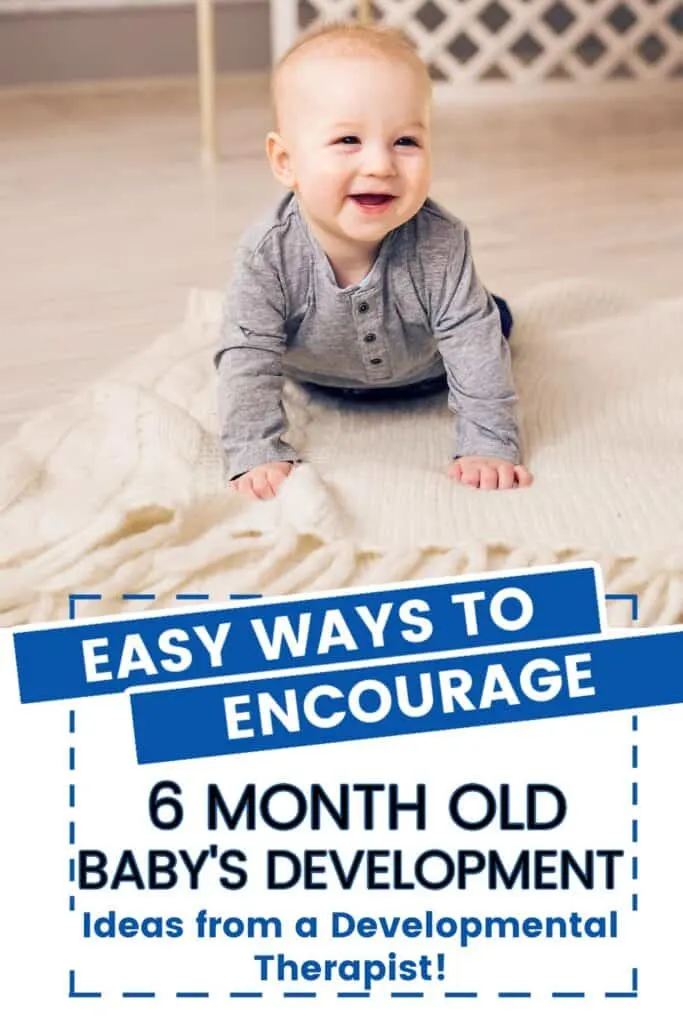

Kayla O’Neill has a master’s degree in education as well as a bachelor’s degree in special education with an emphasis in early childhood education. She has been working as a developmental therapist with babies and toddlers in early intervention since 2012. She is also a mom with two young children.
